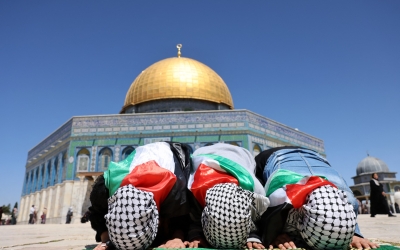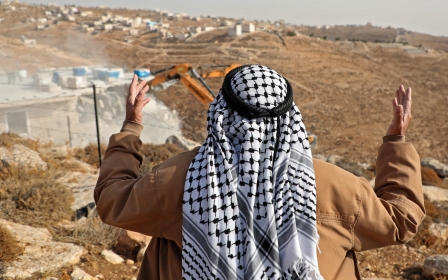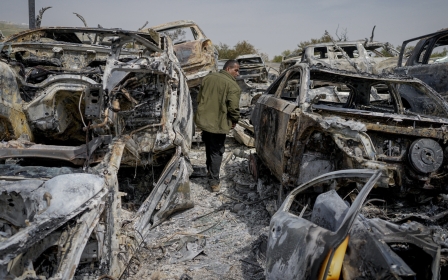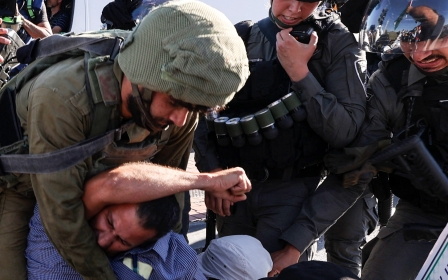Israel-Palestine: What's driving tensions in the West Bank?
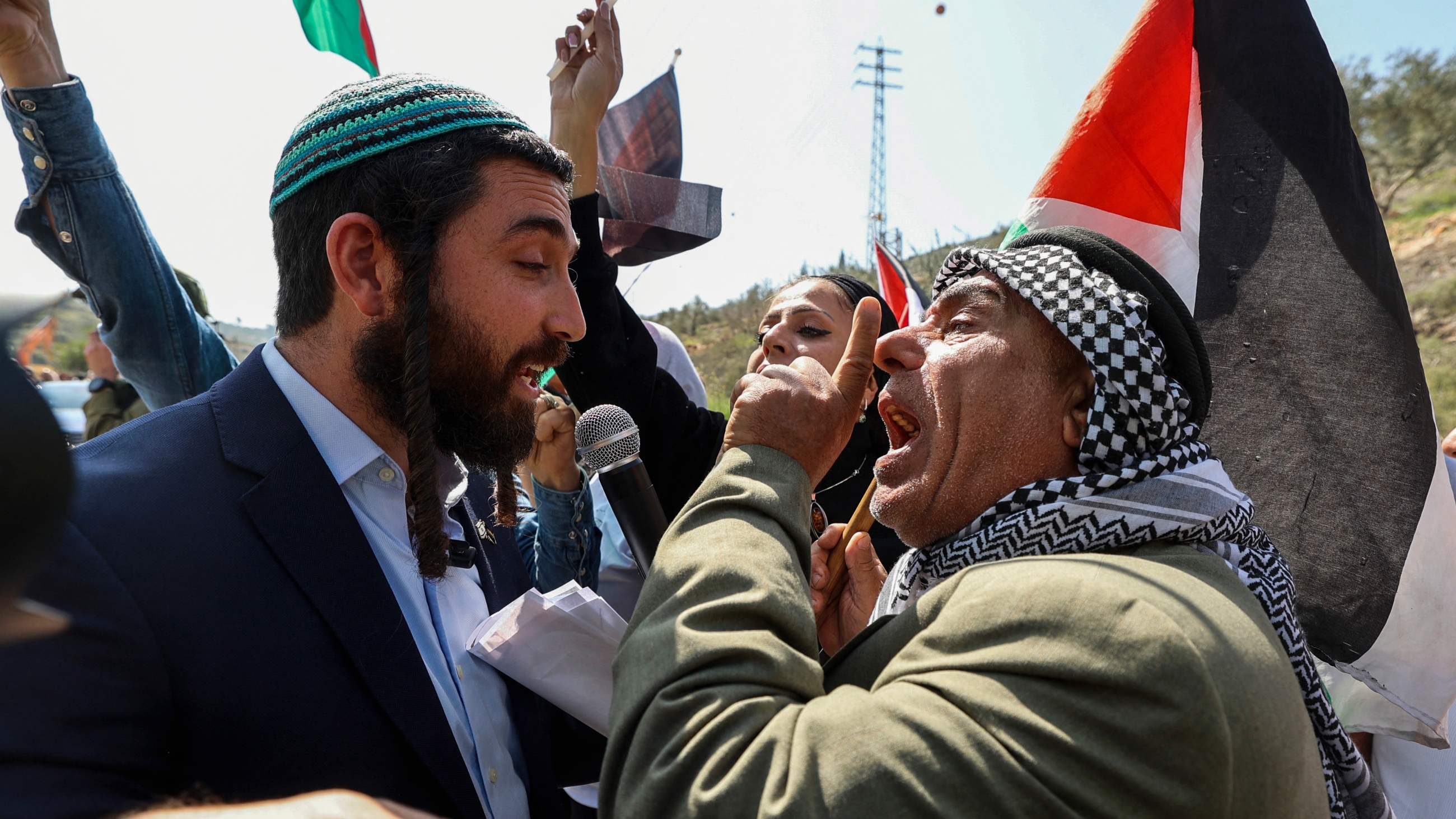
Fears are growing that a wider outbreak of violence could flare in the occupied West Bank as Israeli attacks intensify and Palestinian resistance grows.
There has been a sharp uptick in the number of Palestinians killed by Israeli forces and settlers in recent months, with the increase happening amid a radical change in Israeli politics where more and more officials are spewing vituperative anti-Palestinian remarks.
With Muslim, Christian and Jewish holidays overlapping next month, many fear the worst is yet to come.
Middle East Eye looks at the current tensions, the factors driving them and what the future could hold.
.
New MEE newsletter: Jerusalem Dispatch
Sign up to get the latest insights and analysis on Israel-Palestine, alongside Turkey Unpacked and other MEE newsletters
What's happening?
The recent spate of attacks against Palestinians have been concentrated in the West Bank and East Jerusalem, territories Israel has occupied since 1967.
Israeli forces and settlers killed at least 167 Palestinians in the West Bank last year and have killed at least 71 since January this year - which corresponds to at a rate of nearly one killing every day.
It's the bloodiest start of a year since 2000, according to the Palestinian health ministry.
Palestinian attacks against Israelis have also increased. At least 30 Israelis were killed by Palestinians in 2022, the worst Israeli death toll since 2008. This year, at least 13 Israelis have been killed.
Meanwhile, Israeli settler violence has been on an upward trajectory for years. UN data shows there has been a 137 percent increase in attacks between 2020 and 2022.
Suspected settlers have killed at least nine Palestinians since 2022.
Settlement expansion is also growing. Nearly 700,000 settlers live in more than 250 settlements and outposts across the West Bank and East Jerusalem in violation of international law.
In East Jerusalem, Palestinians warn that Al-Aqsa Mosque is facing an unprecedented push by Israeli settler groups and MPs to undermine its status quo as an Islamic site.
The number of settlers who entered the mosque's courtyards during near-daily incursions has grown by nearly seven-fold in the last 10 years.
Some of the settler groups organising these incursions want al-Aqsa Mosque destroyed and a Third Temple built in its place. Some MPs have advocated for Israel to "regain full sovereignty" over the site.
Israel's control of East Jerusalem, including the Old City where al-Aqsa Mosque is located, violates several principles under international law, which stipulates that an occupying power has no sovereignty in the territory it occupies and cannot make any permanent changes there.
Palestinian citizens of Israel have been also facing growing state discrimination and violence.
Since the new Israeli government was sworn in at the end of last year, at least 50 government decisions or parliament laws have been introduced targeting Palestinian citizens, according to the Nazareth-based Organisation for Human Rights Meezaan.
They include legislation that gives the government the power to strip their citizenship or residency and apply the death penalty to convicted "terror" offenders, among other bills.
What's driving the tensions?
It's difficult to pinpoint a specific event that triggered the current wave of tensions, however, analysing various data, the events of May 2021 seem to have contributed to invoking some longstanding grievances for Palestinians that led to where we are today.
In 11 days of conflict triggered by Israeli violations in Jerusalem - including the attempted expulsion of families in the Sheikh Jarrah neighbourhood and attacks on worshippers at the al-Aqsa Mosque - Israelis and Palestinians faced off in rare mass confrontations across mixed Palestinian-Jewish Israeli cities, occupied East Jerusalem and the Gaza Strip.
While protests and confrontations were also organised in the West Bank, armed clashes between Palestinians and Israeli forces were almost nonexistent during the 11 days of violence.
Of the total 274 Palestinians killed by Israelis at the time, 28 were from the West Bank. Thirteen people were killed on the Israeli side.
Since then, however, armed Palestinian resistance in the West Bank has spiked. At least five new armed groups have been created in the last two years in various cities - including Jenin, Nablus, Tulkarm and Jericho.
Members of such groups say they pick up arms to defend Palestinian cities and refugee camps against near-nightly Israeli search-and-arrest raids. They also attack Israeli checkpoints, military posts and settlements.
Data from the Israeli military shows a 367 percent increase in shootings at Israeli targets in the West Bank between 2021 and the end of 2022.
Since May 2021, Palestinians have killed at least four soldiers and 13 settlers.
The new groups, made up mostly of young men, largely break away from traditional Palestinian parties and adopt cross-factional rhetoric and strategy.
This has attracted more and more people to join as frustration among young Palestinians grows at political leaders, especially the PA.
The emergence of such groups has exposed weaknesses in the Ramallah-based authority, which since the Second Intifada maintained a strong grip on internal dissent as well as acts of armed resistance against the Israeli occupation.
Now the PA seems to have lost its security control over cities technically under its administration, like Jenin and Nablus.
On the other hand, Israel voted in what has been described as the most right-wing government in the country's history in late 2022.
Prime Minister Benjamin Netanyahu outlined the government's agenda, which puts settlement expansion at its heart and hints at intentions to annexe the West Bank.
Several pro-settler ministers and MPs have publicly called for and pushed through harsher measures against Palestinians. For example, Bezalel Smotrich - the minister of finance who is also responsible for Israel's civil administration in the West Bank - has called for a Palestinian village to be "wiped out".
Smotrich is also an outspoken advocate for settlement expansion and annexation.
What does the future look like?
With Israel continuing to grow its settlements and entrenching its occupation, a political solution seems as distant as ever.
Since the Second Intifada fizzled out in 2005, Israel launched over five bombing campaigns in Gaza, a wave of Palestinian deadly stabbing attacks surged in 2014-2015 and both Israel and Palestine were engulfed in widespread conflict in May 2021.
It's hard to predict what current tensions will lead to, if any, and how similar they will be to a recent event.
But challenges today - like the Israeli ultranationalist government, the growth of Palestinian armed groups and the fragility of the PA - are different from previous years, which is why intelligence agencies, diplomats and analysts have been increasingly warning of the likelihood of a massive flare-up.
CIA director William Burns recently said current tensions bear an "unhappy resemblance" to the Second Intifada.
The threat of an uncontrollable outbreak of violence has prompted Jordan, Egypt and the US to lead de-escalation efforts in recent months.
But events such as the unprecedented settler rampage through the Palestinian town Huwwara last month - which took place as the US, Jordan, Egypt, Israel and the PA held security talks - give an indication to what could lie ahead.
Concerns are especially high ahead of April when Passover, Easter and Ramadan will overlap.
On Passover, Israeli settlers will look to make unsolicited visits to the courtyards of al-Aqsa Mosque during Ramadan, a time when the mosque is normally filled with Muslim worshippers.
Israel's far-right national security minister, Itamar Ben-Gvir - who oversees Israeli police strategy in Jerusalem including at al-Aqsa - has previously called for imposing "full [Israeli] sovereignty and hoisting the Israeli flag" in the mosque.
How the Israeli army's operations in the West Bank and security in Jerusalem are managed will be crucial to how events play out in April.
But regardless of how the month passes, if the underlying factors driving current tensions are not resolved soon, the threat of a wider flare-up is not likely to go away.
This article is available in French on Middle East Eye French edition.
Middle East Eye delivers independent and unrivalled coverage and analysis of the Middle East, North Africa and beyond. To learn more about republishing this content and the associated fees, please fill out this form. More about MEE can be found here.


